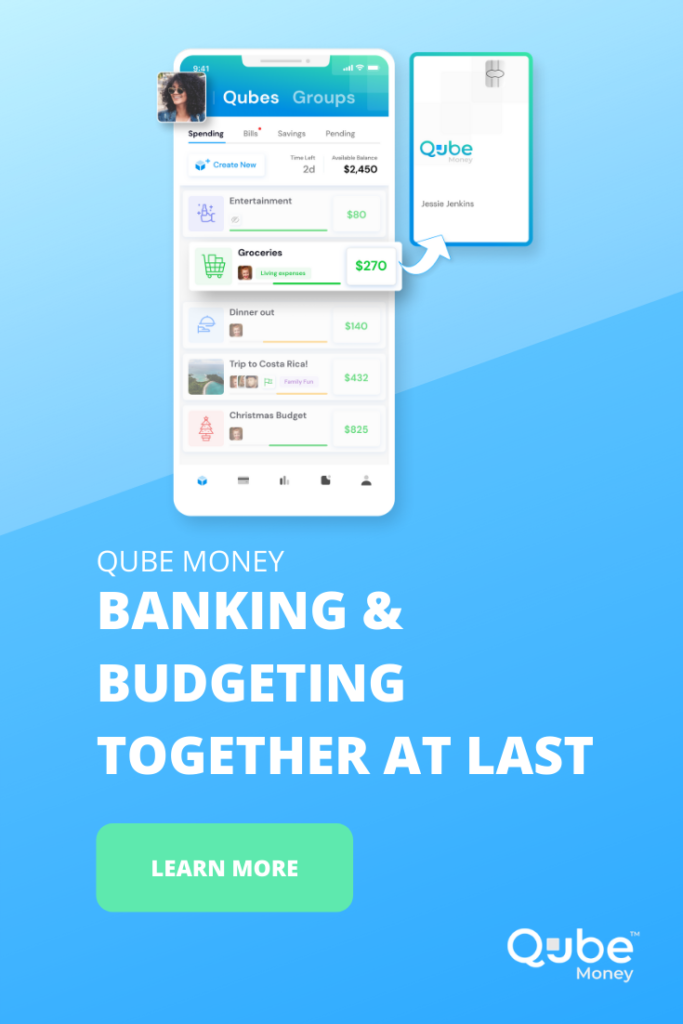July Expert Series:
Featuring Kevin & Sue
from Qube
Masters Program
Qube Money July Expert Series with Kevin & Sue From Qube Masters Program
Callen
Here we are with our July Expert series, and this month, we are so excited! We have two guests on our Expert series. We have Kevin and we have Sue. They are part of our Qube Masters program, and you guys are both financial coaches, right? But it’s summertime, the housing market. We have the word recession buzzing around. There’s so many things we could talk about today. I want you guys to first introduce yourself to our users so that they can get to know you guys. So, sue, why don’t we start with you? Tell us a little bit about even your background, your family, where you live, and then a little bit about what you do for work.
Sue
Sure. My name is Sue Malzonato. My company is called Wallet Wise Coaching, and I spent 25 years in corporate accounting, former CPA, and I now am thrilled to be helping other people manage their personal finances. It’s been a passion of mine forever. I absolutely love doing it. So I work with individuals, couples, generally, people who find budgeting frustrating, useless, or both, and for people who are paying all their bills but not really building any significant wealth. So when I first heard about Qub Money, I got really excited because this has been such a great tool for my clients. So that is what I do now. I help people figure out their money.
Callen
Okay, that’s awesome. We’ll dive into that in a second. And then, Kevin, tell us a little bit about yourself.
Kevin
Sure. Thank you. My name’s Kevin Mosby, and I’m also a financial coach. Unlike Sue, I still work in the corporate sector as well, so I do financial coaching, and I work in the private sector, so I’m an insurance guy by trade. I’ve been in the insurance business for almost 28 years now. And similar to Sue, I just help people manage their day to day finances so that they can find some freedom. It’s easy for people to kind of find financial advisors and investment advice, but it’s really difficult for people to find that day to day financial management and financial habits. And so really, all I do is try to support people and provide help in figuring out how to simplify the complex with their finances.
Callen
Amazing. Oh, my gosh. I need you both. Okay, so, sue, where do you live?
Sue
I live outside Baltimore.
Callen
Oh, so fun. Okay. What’s the weather like there?
Sue
It’s a little bit overcast and a bit humid. Around 80 degrees right now. Kevin, we’re not complaining.
Kevin
I am in Ohio. I live in a city called Mason, Ohio, which is famous for Kings Island, the amusement park.
Callen
Oh, cool. Okay, let’s get right into this. One thing that I see a lot when I talk to people about budgeting and finances. And even now, my husband and I were looking at buying a house as an investment property. What are financial fails, as we call them, that you see people doing? Whether they are young or they’re older or when they’re first married, they make these mistakes. Like, for example, one, I know some people in my family and that I’ve known have had issues with credit card debt. And it’s so easy to swipe that credit card and you just rack it up. It’s like free money until you get the bill. So, what are some financial fails that you guys see currently?
Sue
This is an easy one for me. It is death by 1,000 easy monthly payments. Easy monthly payments. So the small ones, meaning credit cards and things like that, even something like a peloton or your Verizon phone, the easy monthly payments. And these things chip away at your monthly cash flow. And then you wonder, why can’t I save money? Then we get to the bigger ones, like student loans and cars. Cars is the number one. So if it could rewind 20 years and start over and never have a car payment your entire life, you will be so much further ahead of where most people are.
Callen
Done. So, I’ve done the easy payment thing on accident. I purchased the shirt online, and it’s like the afterpay that’s like what you’re talking about, right? The different payments you can do. So one of them was like, after pay from some boutique, and I accidentally selected it. And I’m like, I have like four easy payments of 1799 to pay off this shirt. It’s ridiculous. I was so mad. But I’m like, it’s so easy to click that. And they opted me in without you have to actually opt out on that specific site. That kind of bothered me. But okay, that’s a good one. That’s a really good one. And a good tip about the car because I did purchase my first car. And then my second one, I got a loan, and it was so much easier when I didn’t have that car payment to take that lump sum out every month. Okay, Kevin, any thoughts on that?
Kevin
Yeah, easy. So I agree with sue 100%. And I would say the other thing is, you don’t know what you know until you figure out that you know it. And so what I mean by that is, if I were to ask you, how much do you spend a month on food? I don’t know. Well, you could look at your transactions, and you could see it, but you still don’t know. So, what I find when I talk to a lot of clients is they don’t know how much money they spend. They don’t know where their money is going. And when you start to just help them to look at what they’re spending their money on, they start to very quickly realize, I might be able to cut that out. Dining out is probably the biggest area where people are amazed at how much they spend. Subscriptions is another and so what I would say is that you really want to help people figure out where they’re spending their money, then they can start to figure out where they want to spend their money.
Sue
That’s a really good point, Kevin, where people automatically assume that you hire a financial coach, and the first thing they’re going to say is, stop eating out. Cut your table. And that’s absolutely not the case. You find that once you even have clarity around where your money is going, you will automatically, automatically just say, oh, my God, I didn’t realize I was wasting so much there. I don’t want to do that. And so it doesn’t feel like deprivation. It feels empowering because you’re making those choices actively. And so you find that you’re even a very average income can go a lot further than you think when you really are paying attention and being intentional.
Callen
Right, absolutely. That’s true. I feel like, too, even for me, one of my people ask, oh, what do you want to spend your money on? Like, for women, it’s like designer things or whatever your thing is. And I’m like it’s not. Mine is eating out. Like, hands down. I get so much satisfaction. But I feel like if I met with you, sue, you’d be like, you can still do that if that’s your priority, that’s where you want to put that money. So that’s a good thing to know about financial coaches, too, and you both agree on my next question, is, do you guys feel like the majority of Americans are living paycheck to paycheck because, A, they have to, or B, because they’re not financially planning well enough to allocate their money and their funds in the correct way?
Kevin
I can start I mean, I think it’s obviously very individual. I would say most people don’t realize where their money is going, so they don’t recognize that they’re living paycheck to paycheck. So most people who live paycheck to paycheck probably have an opportunity not to, but they just don’t realize or know how to get there. And so that’s where I think Sue and I come in as coaches to help them figure that out. Most people have more than enough money coming in to pay their bills and their expenses, but they’re paying other things that they don’t necessarily recognize. And so at the end of that month, they’re like, where did all my money go? And so a good coach, I think, can just help them figure out, hey, here’s where you’re spending your money. Is that where you want to spend it? And once that client figures out, yeah, that’s where I want to spend it, then we can just stand beside them and support them to make sure that they’re doing that. And sue had mentioned something earlier about Qube money. That’s a tool that I really see value in when I’m talking to clients because it makes them do that on the front end. That’s the struggle that most people struggle with. I can tell you where I spend all my money at the end of the month, but that has no influence on the fact that I already spent it. And so Qube really helps them to think about that on the front end.
Sue
Another way to think about this are people either not making enough money for most people, you think about what you made even two years ago, and if you’ve gotten pay increases in the past two or three years, five years, ten years, what you were making, are you doing any better with your money now than you were when you were making that much less way back then? Most people aren’t. Most people, it just kind of gets added in and it’s just lifestyle creep or whatever happens if someone’s thinking, yeah, another 5000 would make so much difference. When in reality you look back at what you made five or ten years ago, it’s like, no, it doesn’t. There’s definitely habits and things that can be formed to really make the most of what you have. And then what you may find is you don’t have to have that high stress job. You can take a step down and spend more time with your family because your lifestyle doesn’t really cost as much as you thought it did. And that’s where financial coaching is the ultimate life changing investment for people because you just are able to do things that you didn’t think were possible. Because I don’t have the money.
Callen
Yeah. We hear the word freedom a lot here, and I feel like that’s exactly what you’re talking about. My husband and I talked about this a couple of months ago. We looked at our budget and what we were making when we first got married. And I’m 30 and he’s 30 something, I don’t know exactly, but we’ve been married for eight years. And we looked at I kept a little budget on my notes in my phone, and we looked at, okay, our first year of marriage, I think it was something crazy, like, we made $2,500, something insane. And now I think about it and I’m like, okay, wait. But we look at it and we pay all of our bills on that. And we still ate out, and we still were able to pay for traveling. So I’m like, what are we doing? And it makes you kind of reevaluate and say, okay, how much do I actually need? Is it that much? Or do I just need to learn what I need to know and how much I have, how much I spend? I think knowledge, like you were saying, Kevin, it’s power. And if you don’t know how much you’re spending you really have no idea. And you could definitely even that high stress problem, like taking a step down, that’s got to be a big relief for some of your clients to be able to say, hey, I don’t actually need this.
Sue
I get it. Yeah.
Callen
I’m like you seem like a great example.
Kevin
Something that I heard, which is budget. I think a lot of times people think, well, a financial coach and a budget. And so that’s not a term I use in my practice. It’s really a spending plan. You’re trying to figure out how to spend your money, and I’m building a plan for it. And I think people sometimes think the term budget is really restricting when what you’re really doing is saying, I want to spend my money on these things. And when you do that, you do build a budget, but it doesn’t have to be called that for it to work like one.
Callen
Well, and I’m like I hear the word spending, and I’m like, that’s fun. And your brain is wired that way, so it is interesting. I like that. I like that you don’t use that word.
Sue
I actually built out as well.
Callen
Exactly.
Sue
If you have a spending plan, it’s like, yes, you have an eating out in your spending plan. This is in my plan, and there’s no sort of guilt around it.
Callen
I’m going to say that to my husband. It’s in my plan. Go look in there. Okay. What would you say for each of you, your biggest strength is as a financial coach? What would you say if they were like, hey, Sue, what would you say you’re so good at? Or you help your clients with? Or what do you feel like is your biggest strength with what you do?
Sue
I would say experiencebeing in fluctuating budgets, experience in managing money for a really long time with kids without kids, one income, two incomes, and just able to work with people without judging that’s key.
Callen
Because I’m like, everybody doesn’t want to feel like they’re going in and getting you know, if someone’s, like, looking at what they’re doing and saying it’s wrong, are you really messed up?
Sue
There’s a stigma around it. Right. People hire personal trainers at the gym, and they brag about it.
Callen
Right? Yes. And the financial coach is like, oh, it’s almost like the stigma you hear with therapy right. Which I think is shifting and it’s changing, but it’s like, oh, you’re going to therapy. Not, oh, good for you. Good for your mental health. Go to therapy. So I get that. That’s awesome. Okay, Kevin, what about you?
Kevin
Yeah, it’s tough question to talk about yourself and what you do well, so I’m going to base it off what other people have told me, which is ability to listen and empathy. I think most people, when they’re reaching out for a coach, they’re in a position where they’re looking for help and they’ve taken the bold step of saying, I need help. And so as a coach, I really just have to sit down and listen to what it is they’re going through, listen for what their financial picture is so I can start to provide them feedback that’s specific and relevant to them. Most of the good coaches, that’s what they do. They listen and they observe, and then they offer insights when the opportunity allows.
Callen
I love that, and I love that you said that’s what your clients say about you. Okay, my last question for you guys as we’re wrapping up here, will you give me a handful, maybe three tips that each of you would see as starting out? So someone who’s watching this or listening to the podcast, what are the basics? Obviously, maybe they have a cube account, maybe they don’t. What would you say to someone who’s like, hey, I need a fresh start. I need to get this under control? What are some of the basic tips that they can start doing in their everyday life that is not going to be super overwhelming?
Kevin
Well, you’re probably disappointed because you could probably search in Google and find the same answers that we’re going to give you. But for me, the first thing would be is to figure out where your money is going. So I would say make sure that you monitor your spending, look at your bank statements, and figure out where you’re spending your money. The second thing I would say is pay yourself first. So make sure you’re paying yourself and putting money aside for the things that you want to do. And the third thing is to make sure that you’re giving some of your money away. It just builds the kind of financial habits, and people and they don’t recognize it because they think, I’ve got to give money. I don’t even have money to give away. But what you find is once you start building helping habits, giving is fundamental to allowing those habits to really grow.
Callen
I love that. That’s not one that I hear very often, so I love that. Sue, any tips?
Sue
Yeah. Kevin’s were right on. I also include giving, even if it’s just $5, like just something even $5 is enough for. Like, if you’re on the line getting coffee, you pay for the coffee for the guy in front of you. That completely changes your day, and it changes their day, and it’s $5. It doesn’t have to be a lot, but just something in a giving bucket. The other thing I recommend for couples is to have a little bit set aside for him and for her. I think having shared finances is really useful in terms of building your feature together, but there should be a little bit of money. An amount equal doesn’t matter who makes what, but an equal amount for him and her to be able to do something with. Like if he wants to go with the guys or he wants to get her meals done. Just something that is like, no questions asked. I think that’s really healthy in terms for couples that are just a little bit different. And lastly, saving is definitely something you need to do. You’ll never build wealth if you’re not able to save anything but short term and long term. So short term meaning things that you know are going to come up, like holidays or birthdays or vacations, and then also some savings for things like that. You don’t know when they’re going to hit, like a car repair or something with your house breaks down, something along those lines. So, again, two, money has been amazing for all of that. I’m using it personally. I’ve gotten rid of my spreadsheets. It’s amazing.
Callen
No more spreadsheets. I love hearing it. Oh, my gosh. Okay, well, thank you. I love all those tips. I’m going to go back and rewatch this and write everything down. Thank you guys so much for coming on. There are so many questions we did not have time to get to that I had prepared. So I’m thinking we’re going to have to do a part two because there’s so much I want to talk to you guys about, and you are so full of information. I’m like, I need another hour. We just have these 15 minutes clips. Is there anything else you want to add before wrapping up? Thank you again. It’s been so awesome having you on here. It’s so refreshing to hear from people that will give real life testimonials with their clients and how you guys actually make it work for people in all salaries and income. That’s awesome. Okay.
Kevin
Yeah. I would just say thank you for giving us the opportunity to talk with you. And if you’re thinking about getting a coach, reach out and just see what they have to say, I think you’ll be surprised to find out that they really are informed and in position to really help.
Callen
Yeah, I love that. Okay, thank you, guys. We will look for this. We’re so excited. And then we’ll hear apart, too. I’m sure of it.



![Everything You Need to Know About the Cash Envelope System [+ Sample Budget]](https://blog.qubemoney.com/wp-content/uploads/2020/01/1-20-20-the-cash-envelope-system-blog2-440x264.png)

